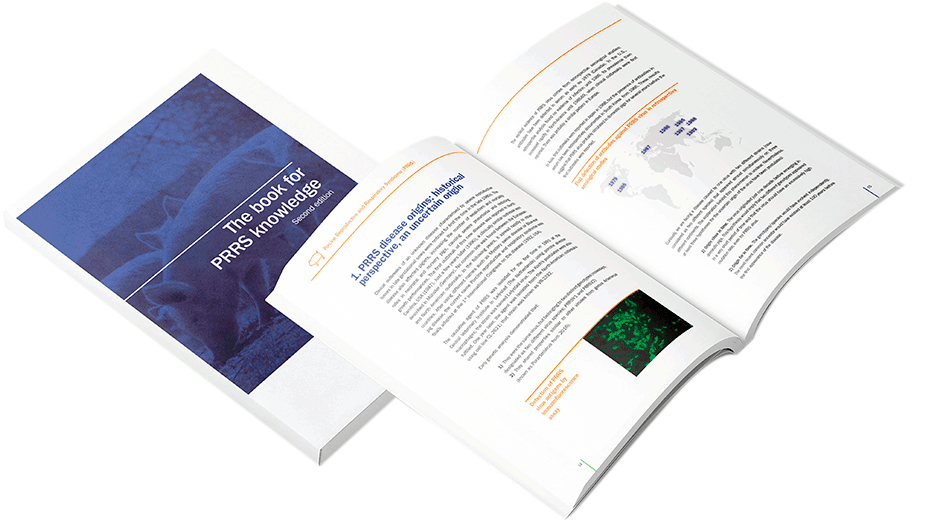Notes
Joel Miranda et al. IPVS 2024
This study assesses the effectiveness of two commercial live vaccines – based on PRRSV1 (UNISTRAIN® PRRS; HIPRA) and PRRSV2 (strain VR- 2332) – against an Asian PRRSV2 field strain.
Notes
T Shimada et al. IPVS 2024
The aim of this study was to compare the efficacy of a PRRSV1 vaccine and a PRRSV2 vaccine on a PRRSV2-infected farm in Japan.
Notes
Joel Miranda et al. IPVS 2024
The goal of this study was to evaluate the efficacy of two commercial PRRS MLV vaccines – one based on PRRSV1 (UNISTRAIN® PRRS, HIPRA; IM and ID), and another on PRRSV2 (strain VR-2332; IM) – in growing pigs on a Japanese PRRSV2-positive farm.
Notes
Salvador Romero et al. IPVS 2024
The objective of this trial was to determine the humoral (NA) and cellular (CMI) immunity conferred by a PRRSV1 MLV against Japanese PRRSV2.
Notes
Ivan Díaz et al. J Vet Sci. 2023 Sep;24(5):e54.
The aim of the present study was to evaluate the efficacy of a commercial vaccine based on a modified-live PRRSV1 (PRRSV1-MLV) against a Japanese PRRSV2 strain and to compare it to the protection conferred by a commercial PRRSV2-MLV.
Notes
Kyohyun An et al. APVS 2023
The objectives of this trial were to evaluate if a PRRSV1 vaccine could better control coinfection (PRRSV1 and PRRV2) and the time required to detect NA after vaccination in a site 2 farm in Korea.
Notes
Yiu Y. et al. APVS 2023
This study aimed to evaluate the efficacy of using PRRSV1 MLV to improve the stability of a sow herd in a Taiwanese pig farm endemically infected with PRRSV2.
Notes
Adthakorn Madapong et al. Veterinary Microbiology 244 (2020).
The objectives of the present study were to investigate the immune response of pigs vaccinated IM or ID with PRRSV-1 MLV (UNISTRAIN® PRRS). The protective efficacy was evaluated against the challenge with HP-PRRSV-2 (sublineage 8.7/HP-PRRSV-2), either alone or in combination with PRRSV-1 (clade A, subtype 1).
Notes
Ruangurai Kitchodok et al. IPVS 2020
The aim of this study was to evaluate the field behaviour of UNISTRAIN® PRRS MLV vaccine on a PRRSv1 and PRRSv2 co-infected farm with a recent outbreak recorded.
Notes
Ruangurai Kitchodok et al. IPVS 2020
The aim of this study was to evaluate the safety and efficacy of this combination on commercial swine farms in Thailand.
Notes
Yunn-Huah Yiu et al. IPVS 2020
The purpose of this study was to evaluate the cross-protection efficacy of a commercial PRRS MLV vaccine containing PRRSV1 strain on a Taiwanese swine farm endemically infected with PRRSV2.
Notes
Lidia de Lucas et al. IPVS 2020
The purpose of this study was to evaluate the field efficacy of UNISTRAIN® PRRS (MLV PRRSV1, HIPRA, Spain) against PRRSv2 field infection and to determine whether there were differences in terms of piglet performance between UNISTRAIN®PRRS and a commercial MLV PRRSv2 vaccine.
Notes
Ruangurai Kitchodok et al.; Asian Pig Veterinary Society Congress, 2019
Under PRRSV2 field infection in 4 Thai farms, piglets vaccinated with UNISTRAIN® PRRS showed a significant improvement in productivity compared with the unsuccessful outcome achieved with the previous PRRSV2 vaccine.
Notes
Ruangurai Kitchodok et al.; Asian Pig Veterinary Society Congress, 2019
In this study UNISTRAIN® PRRS was shown to be safe and effective in gilts, sows and piglets controlling PRRSV2 clinical problems in 16 Thai swine farms.
Notes
Miranda, J et al.; Asian Pig Veterinary Society Congress, 2019
This study shows how UNISTRAIN® PRRS contributes in controlling reproductive disorders on a Taiwanese farm affected by PRRSV1 and PRRSV2.
Notes
Yunn-Huah Yiu et al.; Asian Pig Veterinary Society Congress, 2019
In the same production system, the heterologous protection conferred by UNISTRAIN® PRRS against PRRSV2 infection was more effective compared with the outcome achieved with the previous PRRSV2 vaccine.
Notes
Miranda, J. et al.; ESPHM Congress 2019.
This study was conducted to test the efficacy of UNISTRAIN® PRRS when administered intramuscularly or intradermally in pigs against a challenge with a PRRSV2 and a challenge with co-infection with PRRSV2 and PRRSV1.
Notes
Lyoo, S et al.; Veterinary Immunology and Immunopathology 2016.
Although this experiment was performed against only one type2 PRRSV isolate, VP-046, MLV vaccine showed a certain degree of efficacy against hetero-genotype PRRSV in the early course of infection.
Notes
Roca, M et al.; The veterinary journal. 2011.
Immunisation with a genotype I attenuated PRRSV vaccine provided partial protection against challenge with a highly virulent genotype II strain.
Notes
Bonckaert, C. et al.; International PRRS Congress 2015.
The results of the study demonstrate that vaccination with UNISTRAIN® PRRS provides a partial virological protection against challenge with the East European subtype 3 PRRSv strain Lena.
Notes
Miranda, J. et al.; IPVS 2014.
Genetic/antigenic diversity and variability in the immunobiological properties of the PRRSV (3,4) may compromise the heterologous protection generated by vaccination in PRRS control strategies. Although PRRS immunity is not yet fully understood, the significance not only of the NA but the cell-mediated immunity is important for a better understanding of vaccine performance (3). The present study showed that primo-immunization of naïve gilts with UNISTRAIN® PRRS induced a significant specific cell-mediated immunity against 5 heterologous PRRSV strains.
Notes
Bonckaert, C. et al.; Porcine Health Management Journal 2016.
This study concludes that vaccination of pigs with the modified-live vaccine UNISTRAIN® PRRS provides a partial clinical and virological protection against the PRRSV subtype 3 strain Lena.






